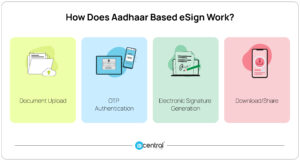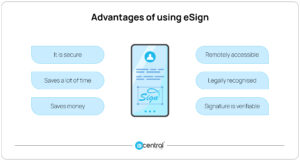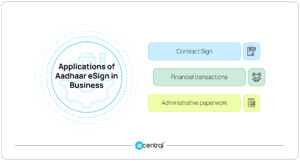The Aadhaar card, which was issued by the UIDAI, is now a requirement for Indian citizens. It is now more than simply an identity card; in fact, aadhaar esign can be used for all financial and administrative activities.
Everyone is required to carry along digital copies of their PAN and Aadhaar card since COVID-19 pushed us to transition to a digital realm. However, aadhaar based esign of your Aadhaar is crucial if you plan to use it online.
NSDL e-Governance Infrastructure Limited (NSDL e-Gov), a licenced Certifying Authority, has declared that it will support the NSDL esign service, an online electronic signature service. Aadhaar holders may now electronically sign documents using biometric and one-time password authentication.
What is Aadhaar eSign?
Aadhaar based eSign: Indian citizens may digitally sign documents using their Aadhaar identifying data thanks to the Aadhaar eSign framework. It is a cloud-based electronic signature solution designed to streamline, expedite, and simplify the process of signing official documents.
You need an Aadhaar card and a registered cellphone number that is connected to your Aadhaar card in order to utilise the Aadhaar eSign. Aadhaar authentication and an electronic signature service provider (ESP) are combined into one useful service. According to the Indian Information Technology Act, an ESP is a reputable third-party organisation that has been authorised by the Controller of Certifying Authorities (CCA).
The Aadhaar eSign service and Aadhar eKYC use a same infrastructure. The key distinction is that Aadhaar eSign offers authentication plus other services, whereas eSign NSDL merely offers authentication plus the electronic signature of the Aadhaar holder.
How Does Aadhaar Based eSign Work?

The following stages use Aadhaar data for digital signature in the Aadhaar based eSign method.
Document Upload: The user uploads the document to be signed on the Aadhaar eSign platform as the initial step. The user must provide their Aadhaar information so that the system may retrieve the demographic information from the UIDAI database. To confirm the user’s identity, this information is used.
OTP Authentication: After entering their Aadhaar number, users will be sent an OTP to the registered cellphone number associated with their Aadhaar. A user’s identity is confirmed by the OTP before the signing procedure begins.
Electronic Signature Generation: The Electronic Signature Service Provider (ESP) generates a digital signature on the user’s behalf following successful aadhaar OTP verification. It is essential to recognise that the ESP causes the signature, not the Aadhaar holder, to appear.
Electronic document signing is accomplished using the generated digital signature. The document is given a digital signature by the ESP, which turns it into a signed document with legal standing.
Download/Share: You may download or share the signed document right from the platform. Depending on the ESP or online platform you use, the Aadhaar eSign procedure may vary somewhat. As a result, it is crucial to refer to the detailed instructions offered by the particular ESP or platform.
Is Aadhaar eSign Legal in India?
Aadhaar eSign is legitimate in India, yes. Aadhaar eSign was formally established by the government in 2015 after being added to the Second Schedule of the Information Technology Act (Gazette Notification No. 2015 Jan – GSR 61(E)). As stated by Section 3A of the Information Technology Act, the government accomplished this.
Thousands of regulated institutions, government entities, enterprise corporations, and enterprises in India utilise Aadhaar eSign on a regular basis.
NSDL eSign Aadhaar Security Considerations
The security of the Aadhaar eSign service is a remarkable feature. The ESP creates a digital signature that is encrypted, offering a high level of security. A timestamp is also included in the document signing procedure to provide traceability and non-repudiation.
As a result, adopting Aadhaar eSign is a safe and reliable method for users with a verified aadhaar card.
In order to utilise Aadhaar eSign, a person must have access to the following:
- Aadhaar cards
- An Aadhaar-linked registered mobile number
- Access to websites that enable Aadhaar eSign
Advantages of using eSign:

It is secure because the keys are immediately destroyed after use – It saves a lot of time – It saves money on paper, travel, and so on – It can be done even in the most remote area and is convenient for those sitting at home – The best part is that it is legally recognised – The signature is verifiable in a variety of ways.
What documents can you eSign using Aadhaar?
Aadhaar eSign may be used on any form of document. EXCEPT for the four categories of papers listed below
- Negotiable instruments (other than a check, demand promissory note, or Bill of Exchange issued or endorsed in the name of or endorsed by an organisation regulated by the RBI, NHB, SEBI, IRDAI, or PFRDA)
- Powers of attorney, excluding those that authorise an institution regulated by the RBI, NHB, SEBI, IRDAI, or PFRDA to act on behalf of (and in the name of) the person executing them.
- Documents that foster trust
- Wills and other testamentary affidavits
Applications of Aadhaar eSign in Business

As a crucial tool for business, Aadhaar eSign is revolutionising how organisations manage procedures involving paper documents.
- Contract Sign: Contract signing is one situation in which Aadhaar eSign is quite useful. Contract signing can be time-consuming and difficult in conventional corporate settings, entailing several procedures and delays because of actual paper work. Businesses may speed up this procedure by enabling fast digital signatures on contracts with Aadhaar eSign. As a result, there are significant time savings, quicker contract execution, and higher production.
- Financial transactions: Aadhaar eSign is a key component of financial transactions. For instance, banks can utilise this service for KYC procedures, credit approvals, and loan agreement signatures. Banks and other financial organisations may improve operational effectiveness and provide better customer service by implementing Aadhaar eSign.
- Administrative paperwork: Extensive administrative paperwork costs time and resources in businesses. Aadhaar eSign can help to simplify operations, reduce paperwork, and expedite approvals. Aadhaar eSign can help with a variety of administrative activities, from employee onboarding to vendor agreements.
Aadhaar eSign and Legal Compliance
Beyond digitalization and efficiency, the significance of Aadhaar eSign is immense. It is critical in ensuring that firms stay legally compliant. The Information Technology Act of 2000 grants legal legitimacy to electronic signatures that meet the Act’s standards. These criteria apply to Aadhaar eSign, guaranteeing that the electronic signatures issued are legally legitimate.
In practise, any document signed using Aadhaar eSign has the same legal standing as a physically signed document. This legal legitimacy is critical for organisations, especially when it comes to legal agreements, financial transactions, or papers that require legal recognition.
Advantage of Aadhaar eSign over alternative eSign techniques
Aadhaar eSign is superior to other eSign techniques due to its ease of use, security, and universal acceptability. Here are a few major benefits of digitally signing a document with Aadhaar eSign:
Aadhaar eSign is legally secure and enforceable in India since it has the presumption of validity under the Evidence Act in addition to the IT Act.
- Accessibility – Since Aadhaar eSign is available on smartphones, it is a generally accepted and simple to use method of eSigning in India.
- Convenience – All you need to electronically sign a document using Aadhaar is a mobile phone and your Aadhaar number.
- Integration with Digital Services – Because Aadhaar eSign can be readily linked into a variety of online platforms, it is an excellent solution for enterprises and service providers in need of a dependable and legally recognised digital signature.Business Aadhaar eSign
- For enterprises, Aadhaar eSign is a game changer. Because of its ease of use and accessibility, Aadhaar eSign introduces enterprises to the realm of digital documents. There are several benefits to adopting Aadhaar eSign in your business transactions:
- TAT is short – Because Aadhaar eSign eliminates the need for paperwork, the process of having papers signed from many parties, which used to take days in physical paperwork, can now be completed in minutes.
- Remote accessibility – Aadhaar eSign enables you to sign documents at any time and from any location, giving you a great deal of freedom.
- Security: Documents that have been digitally signed are more resistant to physical damage and manipulation. The document is very tough to make mistakes in because everything is done digitally.
- Cost-effective – Aadhaar eSign eliminated the company costs of document storage, wasted labour hours at the branch to get the documents signed, and ink and paper costs.
- Solution for ital signing.
Conclusion
In a country as big as India, where geographical boundaries sometimes impede accessibility, Aadhaar eSign acts as an inclusive tool. Individuals having only an Aadhaar card and a registered cellphone number can use this service regardless of location, providing equitable access to key services.